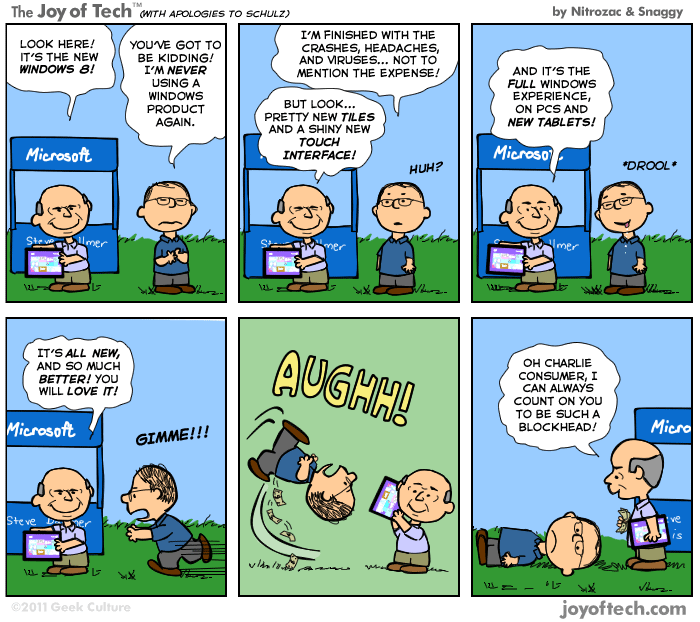Jason Snell writes at Macworld:
The problem with the announcement is that Microsoft has failed to commit to the tablet as a unique type of device. The company that spent a decade trying to push Windows tablets on a market that just didn’t want them is still convinced that it’s a selling point that Windows 8 tablets will run Microsoft Excel for Windows and if you hook up a keyboard and mouse to them, you can get an arrow cursor and click to your heart’s content.
Imagine if Apple had done that with the iPad. When Apple announced the iPad, the company showed off early versions of the iWork apps: Numbers, Pages, and Keynote. Those apps are utterly unlike their Mac equivalents, optimized for the tablet form factor and the size of your fingertips. Imagine if the iPad was, instead, just a tiny Mac that ran the regular version of Keynote. Oh, sure, there might also have been a bunch of touch-focused Dashboard widgets that took greater advantage of the touchscreen, but in the end if you wanted to run a Mac app, you could just do it.
If Apple had done that, I think the iPad would’ve been a failure. The iPad, like the iPhone, was a success because it did not attempt in any way to replicate the desktop PC experience in the way that Windows tablets (and Windows Mobile) did. Apple used the underpinnings of OS X to form the basis of iOS, but at no point in iOS do you see anything that could be remotely mistaken for a Mac. On Windows 8, in contrast, Sinofsky says that there’s no way to kill the Windows desktop: “It’s always there.”
...
With Windows Phone 7, Microsoft made a bold choice: to break free of its past and build a new platform that was specifically designed to run on a phone. One look at the touch layer in the Windows 8 demo and you can tell that something similarly bold is going on. But I can’t help but feel that Microsoft just can’t commit to that level of boldness; maybe it’s pride that stock Windows really should be the basis for a strong tablet operating system?
I quoted a lot from Jason above, and I wanted to quote more but I am reticent to do so because I felt it would be too much. You should really just go read Jason's entire article. Jason writes an article as if it were a 10 book series where the first few novels are just character development. You need to go read his entire piece. It's worth it.

